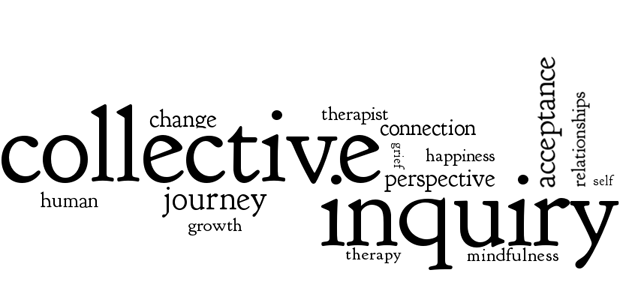

“As a single footstep will not make a path on the earth, so a single thought will not make a pathway in the mind. To make a deep physical path, we walk again and again. To make a deep mental path, we must think over and over the kind of thoughts we wish to dominate our lives. ” Thoreau

Image by skyro
When I first came across this quote, my thought was “Life is so much deeper than our thoughts.” For myself and so many that I have worked with and known, changing your thoughts doesn’t really change the way you feel in most cases. For example, if you’re feeling depressed, thinking happy thoughts probably won’t lift your depression (although if you’re in Peter Pan, they may cause you to fly). Changing your thoughts is related to another common folk-remedy: fake it till you make it. And when the depression, sadness, or whatever we are faking doesn’t go away, we are often left with a sense of guilt or shame: What’s wrong with me that it doesn’t work? Forcing a thought to form a path, using Thoreau’s example, would be like haphazardly cutting down trees and vegetation in a forest to form a path, not realizing that the process of creating and maintaining it would be easier if you pay attention to the landscape and notice a naturally forming path not too far from where you are.
The thought of paying attention to the landscape occurred to me as I thought about this quote a bit further. To really make a pathway in the mind, the thoughts that pave the path have to resonate at a deep level within. For example, thinking “I can do this. I’m not anxious. There’s nothing to fear.” probably won’t do much to reduce my anxiety, but adopting a new perspective such as “How can I best direct all this energy?” can make a change. Many times we run into these thoughts or new perspectives accidentally without seeking them out.
This has happened for me throughout my life. It comes sometimes when I have learned an important lesson. If I didn’t review and ponder on the lesson after learning it, my mind would toss it to the wayside and I would be in danger of repeating the lesson again (which has happened to me many times).
So what changes in perspective have I had? One of the more important has been self-acceptance and not putting pressure on myself to be perfect or be morally above everyone else. My understanding of social constructionism has fit into major pieces of my identity and led me to understand the importance of accepting others (and myself) without judgement or reservations regardless of what they do or believe.
I guess the bottom line is, while I don’t think we can force a thought to create a path worth having, through the process of living, if we are open, we will be provided lessons, thoughts, and new perspectives that we can use to forge a path. This path will not keep us safe from pain, although it may at times bring happiness, but it will be a path that can enrich our life.
What unexpected thoughts or perspectives have you run into that have made an impact on your life? Please share in the comments!
Share your thoughts
4 Thoughts About On trailblazing the mind
I read over that first quote a few times to really let it sink in. I love it. I think there is a large difference between faking your thoughts and changing your thoughts.. and that’s exactly what you hit on. Thanks for sharing.
There is a difference and sometimes it’s difficult to tell when it is faked or when it is in the process of changing. I think when we are quiet and really self-reflect or receive feedback from someone we trust, that is when the difference can become clear. Thanks for sharing!
Wonderful post, which actually illustrates exactly how Exposure Response Prevention (ERP) Therapy, the frontline therapy for obsessive-compulsive disorder, works. Over and over, you work to create new pathways in the brain to rid yourself of OCD.
I also like the “feel” of your blog; though you are all therapists, it’s not too “therapyishy” (how’s that for a word :)!), but as you say, more human. Looking forward to reading more.
We are all about word creation here! There are a lot of developments on developing new pathways in the brain (even mindfulness can develop pathways). They have a lot of implications for treatment and self-improvement.Thank you for your thoughts!